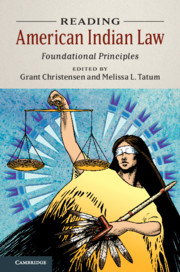Book contents
- Reading American Indian Law
- Reading American Indian Law
- Copyright page
- Dedication
- Contents
- Editors and Contributors
- Preface
- Acknowledgments
- Introduction
- Part I Core Concepts
- Part II Voices
- Part III Property
- Part IV (Mis)Understandings
- 13 Dependent Sovereigns: Indian Tribes, States, and the Federal Courts
- 14 There Is No Federal Supremacy Clause for Indian Tribes
- 15 American Indians, Crime, and the Law
- 16 Factbound and Splitless: The Certiorari Process As Barrier to Justice for Indian Tribes
- Book part
- References
14 - There Is No Federal Supremacy Clause for Indian Tribes
from Part IV - (Mis)Understandings
Published online by Cambridge University Press: 11 December 2019
- Reading American Indian Law
- Reading American Indian Law
- Copyright page
- Dedication
- Contents
- Editors and Contributors
- Preface
- Acknowledgments
- Introduction
- Part I Core Concepts
- Part II Voices
- Part III Property
- Part IV (Mis)Understandings
- 13 Dependent Sovereigns: Indian Tribes, States, and the Federal Courts
- 14 There Is No Federal Supremacy Clause for Indian Tribes
- 15 American Indians, Crime, and the Law
- 16 Factbound and Splitless: The Certiorari Process As Barrier to Justice for Indian Tribes
- Book part
- References
Summary
There Is No Federal Supremacy Clause: illustrates how the Supreme Court’s federalism jurisprudence has recognized the rights of states and placed new limits on the powers of the federal government, even while the courts have steadfastly deferred to the ‘plenary power’ of Congress in the area of Indian affairs. Clinton suggests that the plenary power doctrine is no longer consistent with a textualist reading of the Constitution, and urges instead an interpretation where there is no federal power over Indian tribes at all without their consent manifested through treaty.
- Type
- Chapter
- Information
- Reading American Indian LawFoundational Principles, pp. 334 - 356Publisher: Cambridge University PressPrint publication year: 2019

